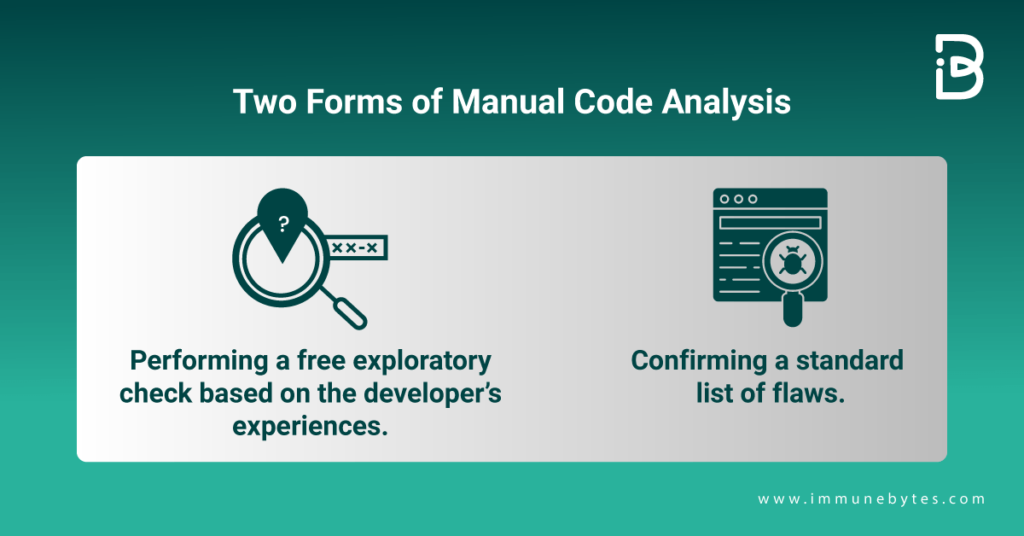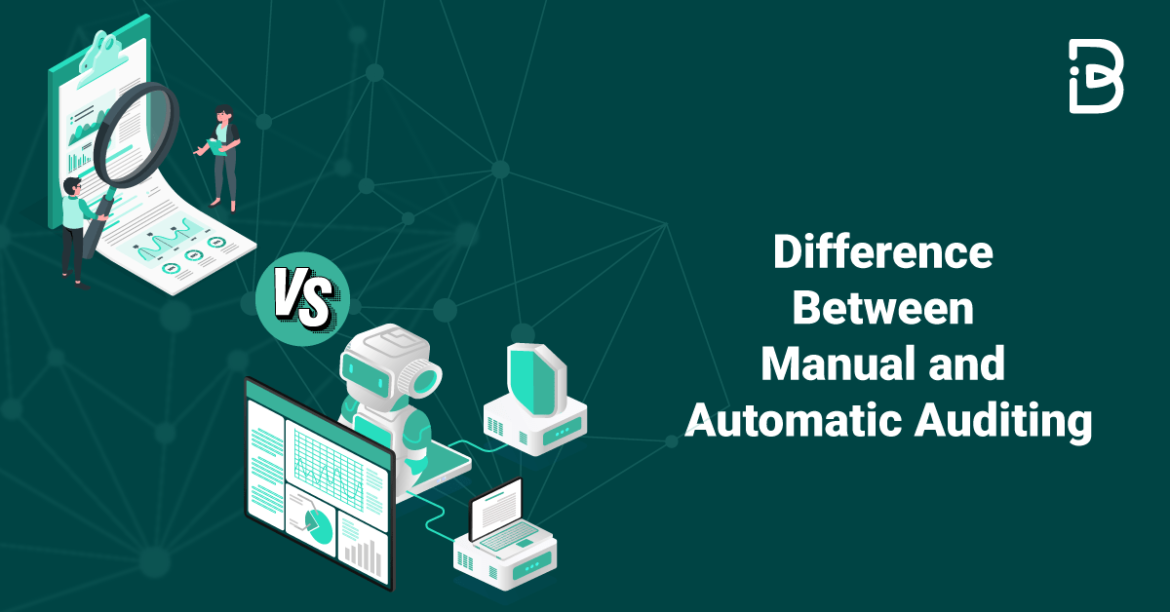The 21st Century has witnessed the coming of ‘Smart Contract Audits.’ Looking for Smart contracts vulnerabilities can not help keep the platform users but also the reputation of a company. Finding vulnerabilities can help to save the entire system from being exposed to the risk of hacker cyberattackers worldwide.
Therefore, it becomes imperative to search for security flaws and prepare an audit report to mitigate the risks of the projects.

There is a huge demand for smart contract auditors for crypto projects such as DeFi exchanges and lending platforms. In these projects, the smart contract code acts as the main engine of the software, where everything else is carried out.
Before we move ahead with the difference between manual and automatic auditing in this blog, let us know a little more about the smart contract auditing process.
What Is The Importance Of Smart Contract Security In Blockchain Technology?
Table of Contents
In the cryptosphere, cracking smart contracts is a common occurrence. The two main categories of crash causes are technical code vulnerabilities and human error. If it is impossible to rule out human error completely, it is vital to rule out technical faults.
Auditing a smart contract means scrutinizing a source code to find the bugs, vulnerabilities, and risks. Most of the time, this process takes place before deploying a code.
It is fantastic to see how the world of crypto revolves around openness and decentralization. Almost every crypto project you come across would have a published line of code on Github to prove transparency and purity.
The crucial point to note here is that there would be so many security issues in smart contracts that can often go unnoticed when it is checked by the programmer who wrote them. This is where the importance of external auditing comes into the scene.
The following are the reasons why smart contract security is important in blockchain development.
- Expensive Mistakes: To avoid costly mistakes, audit your code early in the development lifecycle.
- Expert Opinion: A review by an expert can help remove spurious findings.
- Check out the threats: Keeping an eye out for potential security issues while writing and modifying code can help prevent security assaults.
- Enhanced security: Smart contract security audit can provide reassurance that the source code is safe.
- Security assessment: The auditing procedure for smart contracts enables continuing security evaluations and can enhance your development environment.
Before we give you an insight into the world of smart contract development, let us quickly brief you on the different types of smart contract attacks.
What Are The Different Types Of Smart Contract Attacks Known Today In The World?
Smart contracts are increasing exponentially in number. As a result, cryptocurrency platforms also have an increasing variety of attack methods and smart contract vulnerabilities.

The following are some of the smart contract vulnerabilities:
Reentrancy
A smart contract is built so numerous users or processes can use the exact copy of its instructions stored in memory at once. Users may therefore start multiple transactions and perhaps spend more than their available balance, harming the project.
Additional Read : Re-entrancy Attack: The Ultimate Guide
Byte Array Vulnerability
Performance is impacted by how slowly byte arrays operate. DDoS attacks that bombard an array with numerous requests can quickly bring it down.
Gas Limit and Loops
The maximum amount of gas used by each block to run computations is specified. The transaction will be unsuccessful if the amount of gas used exceeds the cap. As a result, it becomes possible to use various denial-of-service (DOS) vectors. In instances of poor gas processing, infinite loops may happen.
Timestamp Dependence
A miner can slightly alter the timestamp of a block. Although the timestamp can be estimated using the number of blocks and average retrieval time, this method is unreliable due to the variable retrieval time.
These are some of the most common smart contract vulnerabilities. Other than these, there are some more types such as:
- Access control
- Bad randomness
- Arithmetic issues
- Front-running
- Short address attack
- Time manipulation
How To Perform Smart Contract Audit: The Types
A smart contract audit service provider is responsible for finding vulnerabilities as per the particular contract logic of a company. Additionally, it determines whether the smart contract complies with the Solidity Code Style Guide and confirms that it is free of logical and access control issues. Standards for these audits vary from project to project.
There are two types of audits that can be performed to check the vulnerabilities which are as follows:
Manual Auditing
In Manual Auditing, a team of experts/auditors examines each line of code manually to check for compilation and re-entry issues. This can help find additional security flaws that are frequently missed, such as bad encryption techniques.
There can be two forms of manual auditing that are as follows:

How does Manual Testing Work?
Testing by hand is quite active. It necessitates that analysts and QA engineers be heavily involved in all aspects of test case preparation and execution. Everything is done manually, in a step-by-step manner that requires a lot of time and effort.
Automated Auditing
In contrast, the automated smart contract auditing method makes use of bug detection software to assist smart contract auditors in identifying the precise area where problems are to blame. An automated technique is frequently used for projects that need a quicker time to market because it helps uncover vulnerabilities much more quickly. Automated software, however, might not always be aware of the context and might overlook vulnerabilities while inspecting code. Automated analysis is an automatic code analysis that is quicker than manual auditing.
Who runs the test case makes the biggest distinction between manual and automated testing. The human tester performs it during manual testing. The tool performs it during automation testing.
Recommended: Smart Contract Security Audit Company
How Does Automated Testing Work?
Writing test scripts for automated test execution is part of automation testing. A test script is a series of instructions that must be followed on the target platforms in order to verify a feature or anticipated result.
Here’s a quick comparison between manual testing and automated testing that will help you enlist all the points in your mind.
Steps of Performing a Smart Contract Audit
A smart contract audit is conducted using a pretty standard process, while there may be considerable variations across smart contract auditors.

Following are the steps that we take to perform this audit procedure.
Collecting Code Design Models
Auditors gather the code specifications and look over the architecture to assure the guaranteed integration of third-party smart contracts. This aids auditors in figuring out the project’s scope and understanding its objectives.
Unit Tests
After that, auditors run test cases to evaluate each smart contract function. The usage of tools by audit professionals ensures that unit test cases contain the complete code for the smart contract.
Choosing the Most Suitable Auditing Approach
Often, auditors will examine smart contracts without the aid of software because a manual audit is more effective than an automated audit. Attacks like front-running can be effectively recognized using this method.
Work on the draft audit report
Following auditing, auditors create a draught of the code problems found and offer suggestions to the project team on how to correct them. A team of experts is assembled by some smart contract service providers to assist in the correction of each bug.
The final audit report
Auditors release the final report when the flaws have been repaired, taking into account any steps taken by the project team or outside specialists to address the issues that were reported.
An effective tool for enhancing smart contracts’ functionality is a smart contract audit. There were security flaws in what appeared to be nearly impenetrable. Depending on the platform or tool you choose to employ, the cost of the smart contract audit may change significantly.
The effectiveness of smart contract audits is also influenced by a variety of other factors, including communication between the project team and the audit team. To increase their ability to effectively use smart contracts, businesses should focus on recognizing the problems with smart contract audits. Find out more about smart contracts and how auditing them may benefit you right away!

